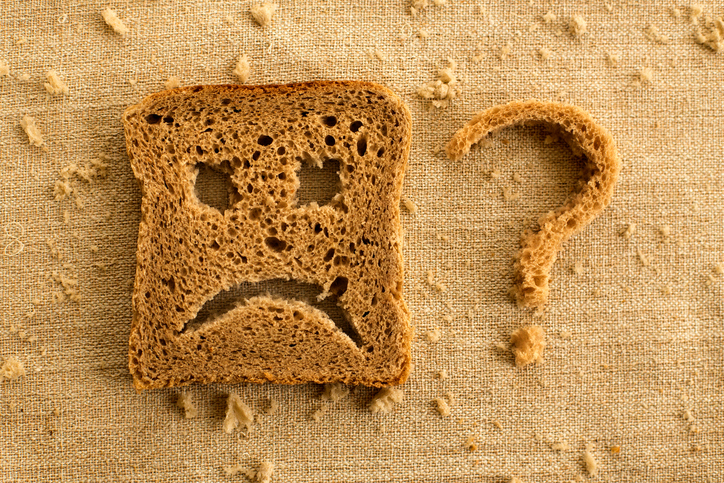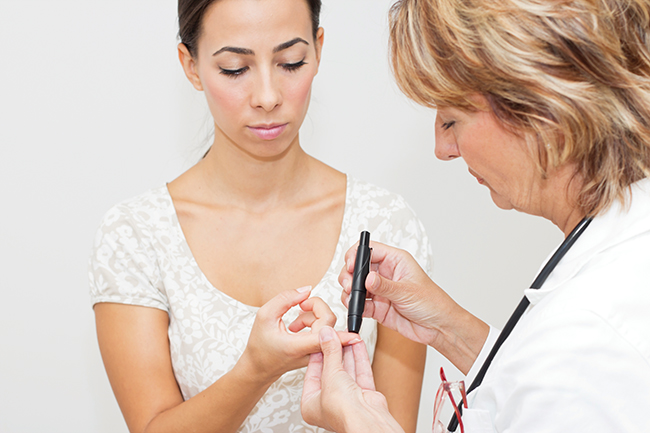Coeliac UK’s Norma McGough says people are still waiting far too long to get diagnosed with coeliac disease – 13 years on average – and more awareness is needed. She gives us the facts on coeliac disease.

Q What is coeliac disease and how is it treated?
A Coeliac disease (pronounced see-liac) is an autoimmune disease which affects 1 in 100 people in the UK. In coeliac disease, the body’s immune system attacks its own tissues when gluten is eaten. Gluten can be found in wheat, barley and rye – some people also need to avoid oats. The treatment is a strict gluten-free diet for life.
Q What are the most common symptoms caused by coeliac disease?
A Although 1 in 100 people have coeliac disease, around half a million people are currently undiagnosed. The common symptoms of the disease, which can often be mistaken for other milder ailments, include:
- Ongoing gut symptoms like feeling sick, vomiting, diarrhoea, constipation, stomach pain, cramping or bloating.
- Feeling tired all the time
- Unexpected weight loss
- Severe or constant mouth ulcers
- Unexplained iron, vitamin B12 or folate deficiency, ie. anaemia

Q Are there less common symptoms caused by coeliac disease?
A Many people see coeliac disease as just a disease of the gut, but in fact different areas of the body can be affected and symptoms vary from person to person. Some of the less common symptoms which affect other parts of the body are:
- Dermatitis herpetiformis, which is the skin manifestation of coeliac disease and is a rash that commonly occurs on the elbows, knees, shoulders, buttocks and face, with red, raised patches often with blisters. It is less common than coeliac disease and affects just 1 in 3300.
- Unexplained infertility or recurrent miscarriage may also be a symptom so testing should be considered.
- Unexplained neurological symptoms (such as loss of balance, uncoordinated movements, numbness and tingling in the hands or feet) which may also be a sign and testing should be considered.
- If you have type 1 diabetes or autoimmune thyroid disease, you are at a higher risk of coeliac disease so testing is recommended, even if you don’t have any other symptoms.
- If you have irritable bowel syndrome (IBS), it is important to make sure that you have been tested for coeliac disease.
The symptoms can be similar and 1 in 4 people with coeliac disease have previously been treated for IBS.
Q Are coeliac disease symptoms different in babies?
A Yes, symptoms can be different and include:
- Bloated tummy
- Irritability
- Faltering growth or a change in growth pattern
- Diarrhoea and other gut symptoms

Q Does coeliac disease run in the family?
A Yes. If you have a first degree relative (parent, sibling or child) who has coeliac disease you should be tested. There are specific genes involved in developing coeliac disease so the risk of having coeliac disease rises to 1 in 10 in families.
Q How is coeliac disease diagnosed?
A The first step in diagnosis is a blood test which can be carried out by your GP. If the blood test is positive, your GP will refer you to a gastroenterologist or a paediatric specialist (in the case of children), who can carry out further tests to confirm the diagnosis. While the tests for coeliac disease are being carried out, it is important to keep eating gluten containing foods such as bread, pasta and crackers. If you are already following a gluten-free diet, the tests for coeliac disease will be inaccurate. To find out more visit www.coeliac.org.uk/coeliacdisease.
Q Why is a medical diagnosis important?
A Confirming the diagnosis of coeliac disease is important to make sure that your symptoms are not being caused by another medical problem. A formal diagnosis will also enable you to access regular follow up care and also means that you can make sure your family are aware that they are at an increased risk of coeliac disease.

Q Is it important to get diagnosed sooner rather than later?
A Yes, a diagnosis of coeliac disease confirms that a gluten-free diet is needed and sticking to the diet is essential to reduce the risk of long-term health complications including anaemia, osteoporosis, neurological conditions such as gluten ataxia and neuropathy and, although very rare, there’s an increased risk of small bowel cancer and intestinal lymphoma. See Coeliac UK’s video at www.coeliac.org.uk/coeliacdisease for more information.
Q Can coeliac disease be cured?
A Not at the moment, but research has been underway for years to find better diagnostic methods, treatment options and a search for a cure. Coeliac UK has recently launched a Research Fund to raise £5m to boost research efforts in these areas. Find out more at www.coeliac.org.uk/researchfund.
Check your symptoms
If you suffer from any of the symptoms detailed below you may find it useful to take the Coeliac UK online assessment for coeliac disease. This short self-assessment will take you through the symptoms of coeliac disease and other risk factors, at www.coeliac.org.uk/isitcoeliacdisease. The assessment gives you a result at the end which you can use to discuss further with your GP.
Coeliac UK
Coeliac UK are the trusted organisation for anyone living gluten-free. Their services will help you shop, cook, travel and eat out with confidence. For just £2 a month (discounts available) you get personalised support, advice from their dietitians and information on venues, recipes and the product suitability of over 100,000 gluten-free and mainstream products to support your diet.

Join today to live well gluten-free. Visit www.coeliac.org.uk/join or call 0333 332 2033.
If you have any more questions about your diet, check out the Coeliac UK website at www.coeliac.org.uk, which is full of evidence-based information and handy tips for living well gluten-free. Or email one of their dietitians with your query at dietitian@coeliac.org.uk.
Norma McGough
Norma began her career as a registered dietitian in the National Health Service. In the last 20 years she has worked in the voluntary sector, heading teams at both Diabetes UK and Coeliac UK. Norma has been working at Coeliac UK since 2003 and is currently Director of Policy, Research and Campaigns.
